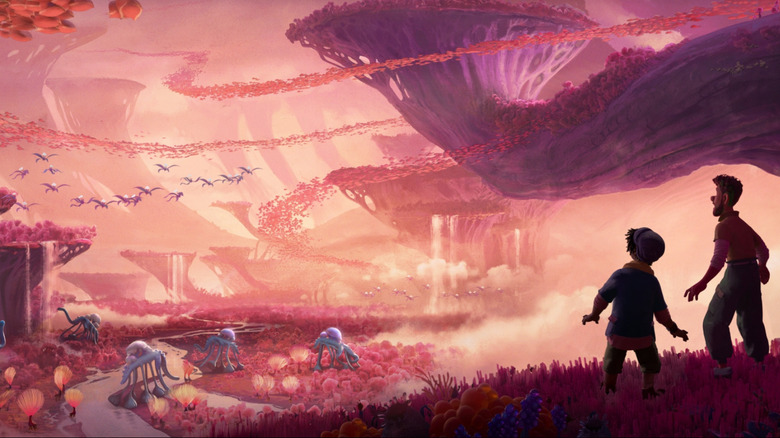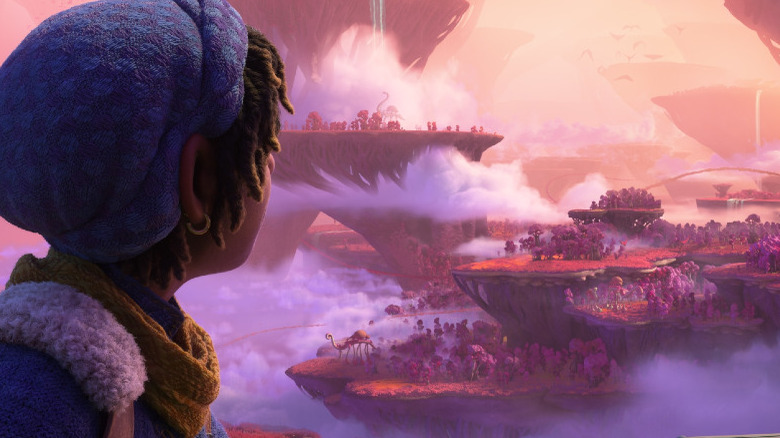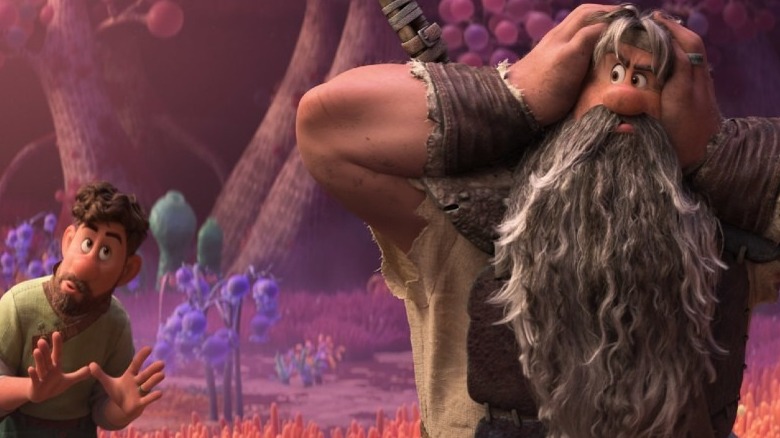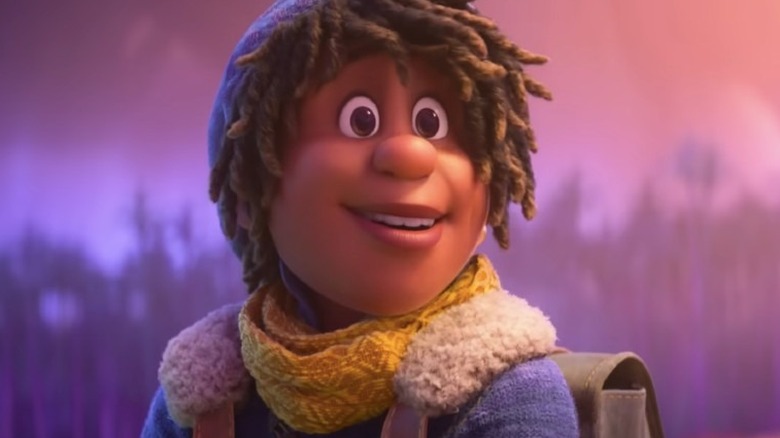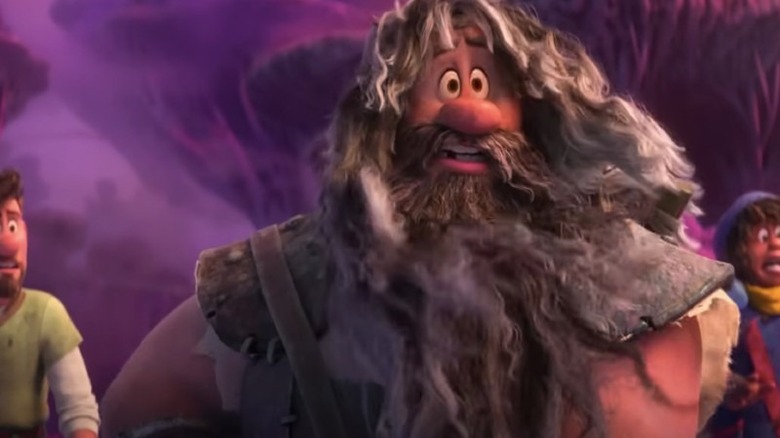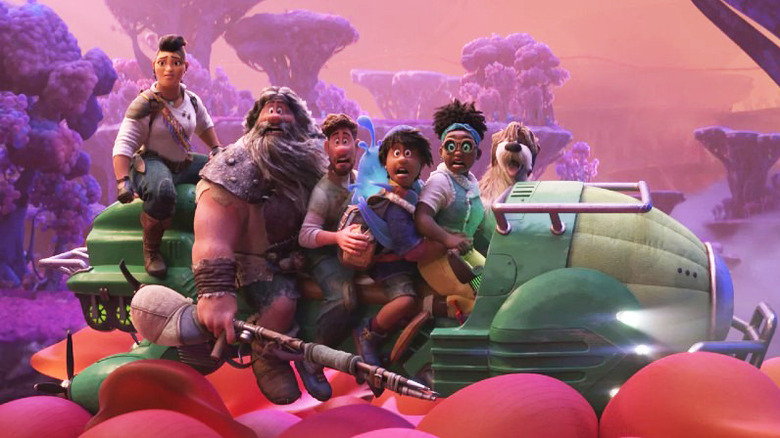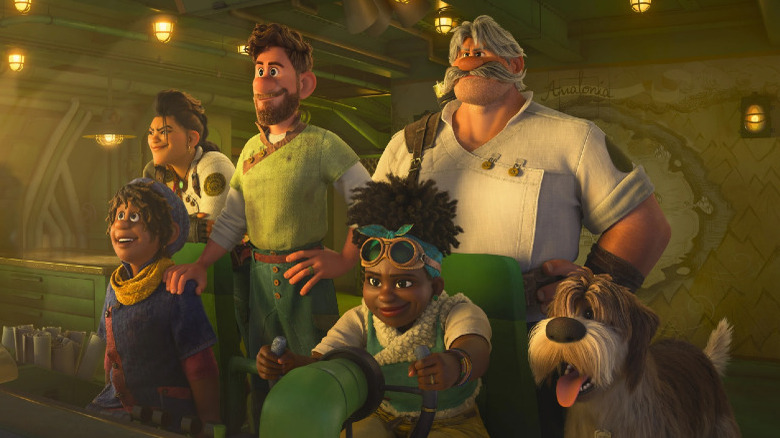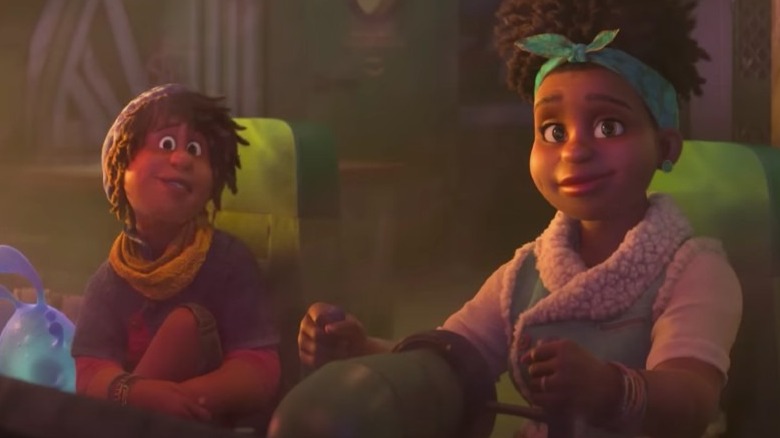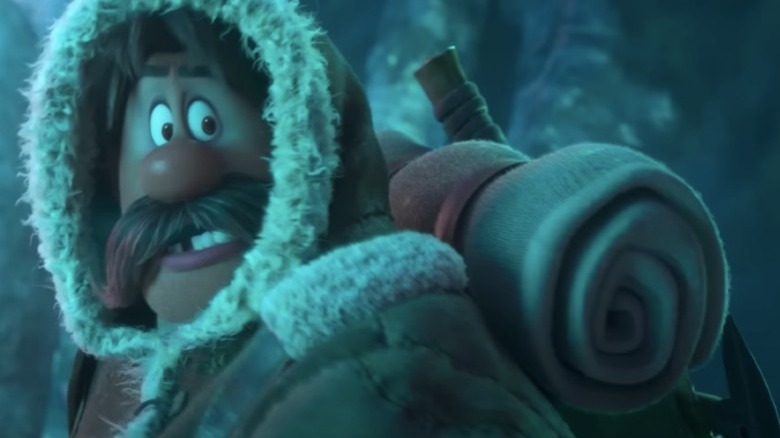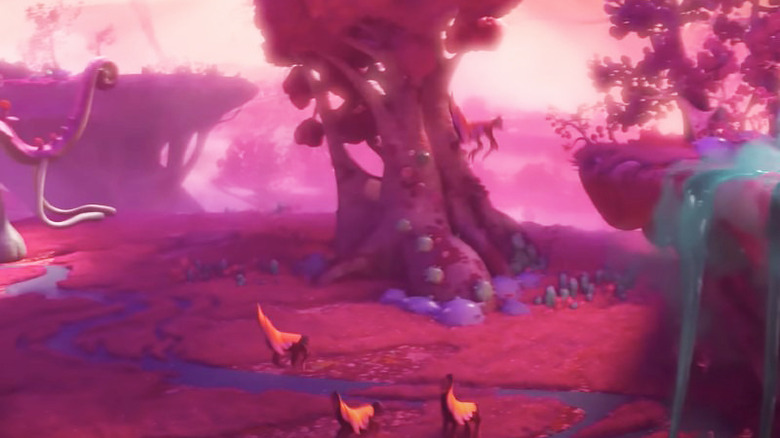Strange World Moments That Went Right Over Kids' Heads
This post contains spoilers for "Strange World."
"Strange World" is full of adventure and heart. /Film writer Josh Spiegel called it "singular and unforgettable," and for good reason. "Strange World" is a magnificently detailed world that immerses the audience in wonder, a real visual treat. Co-written and co-directed by Don Hall and Qui Nguyen, the adventure fantasy follows the Clades clan in their community of Avalonia. Surrounded by craggy, snow-capped mountains, they desperately need to "make a discovery that could change Avalonia," as the character Jaeger (Dennis Quaid) says in a pivotal early scene. Their village is barely getting by and residents humbly accept their modest lifestyle, if not headstrong for something more.
Beneath the shiny exterior, "Strange World" pulses with rich themes spanning capitalism, inherited toxicity, and existential questions about purpose. Kids will most assuredly not pick up on many of these nuanced conversations, which also include what it means to leave a legacy and the importance of being in harmony with nature. Kids can enjoy the adventure, while adults can question their own state of reality in the process. With that said, here are the standout moments in "Strange World" that went over kids' heads.
Capitalism kills
Discovered by a young Searcher (Jake Gyllenhaal), a new plant called Pando becomes the lifeblood of the community. Avalonia blossoms from a meager village to a thriving utopia. When Searcher and his wife Meridian (Gabrielle Union) notice Pando pods are rotting at an exponential rate, it's clear there's something wrong with the once-reliable crop far below the surface. Avalonia leader Callisto (Lucy Liu) arrives sometime later to confirm their suspicions. "I have an obligation to save it," she tells Searcher.
After studying Pando's intricate root system, Callisto surmises they need to travel to the plant's beating heart to uncover the truth. Their expedition takes them through the literal insides of a giant sea turtle. Pando roots appear to be strangling the creature's heart and upsetting the natural order of things. Clade Farms then becomes synonymous with capitalism, and Pando is simply a cog in a much larger machine.
In 2020, a study issued in the scientific journal Energy Strategy Reviews revealed that civilization could very well be crumbling by 2050. The circumstances presented in "Strange World" is a startling page out of reality; without Avalonia residents waking up, their way of life could kill their home. Because their community occupies the back of a sea turtle, it's only a matter of time before it dies. Fortunately, Searcher, Meridian, and Ethan (Jaboukie Young-White) realize that Pando itself is to blame for their misfortunes and are able to course correct before it's too late.
Toxic family
The opening scene clues the audience into the complicated dynamic between Jaeger and Searcher. Jaeger, an explorer by trade, is hellbent on climbing over the mountains surrounding Avalonia and discovering whatever may lie beyond. He forces his own beliefs onto his son to the point that Searcher resents his father. On their adventure, Searcher finds a plant that contains its own electricity and suggests the crew turn back. Jaeger is unable to see the value such a plant could have for the community and instead remains resolute in his plans to forge ahead.
When Jaeger disappears, Searcher harbors anger toward his father. In his attempt to not turn out like him, he ends up treating Ethan the same way. Searcher assumes Ethan wants to become a farmer, but that's far from the truth. "He didn't care about me. He only cared about conquering the mountains," Searcher tells Ethan. It's a rare occurrence that he speaks about his father, and Searcher fails to see he's repeating the very same toxic patterns.
In the climax of the film, Ethan finally admits to his father that being out in the wilderness is exhilarating. Later Searcher blows up at Ethan, shouting, "You're a kid. You don't know what you want." To which Ethan responds, "I know I don't want to be you." It's a harsh response, but it's not untrue. It's within that moment Searcher finally realizes he's been wrong all along.
Ethan's sexuality
Ethan's sexuality is presented without a fuss. A gay teen, he's just trying to navigate puberty and his crush on another teen named Diazo (Jonathan Melo). Once Searcher discovers his father and brings him aboard their ship, Jaeger asks Ethan about any sweethearts back at home. Being the awkward teen he is, Ethan sheepishly dodges the question, all but a confirmation. Jaeger proceeds to give Ethan dating advice and tells him that perhaps putting Diazo in danger and then saving him will spark the reciprocation. To Jaeger, it's no big deal that his grandson likes boys instead of girls — and that's a big deal for a Disney film.
Early in the film, Searcher also displays unconditional love toward Ethan. He tries to play the cool dad when meeting Diazo — who flirts with Ethan over Primal Outpost collectible cards — and later shares that he totally gets why his son is so infatuated with him. What's even more important, Ethan's sexuality plays such a minor role in the film. It just is. His character is far more about figuring out what he wants to be when he's a grownup, finding himself gravitating toward exploring rather than farming like his father. Younger audiences may not quite understand how monumental this all is in a historical context, but they'll at least enjoy Ethan's adventurous spirit.
Leaving a legacy
The best legacy someone can leave behind is "making the present worth opening tomorrow," says Ethan in a closing voiceover. It's been a year since the previous events, and Ethan writes a letter to his father detailing what it means to live fully. It summarizes one of the film's central themes: the pressures to leave a legacy when you die. Throughout the film, Jaeger struggles and firmly believes his own legacy to be climbing beyond the mountains and saving Avalonia. He's so resolute in this mission that he fails to live in the moment.
In turn, Searcher sees his pursuit of a legacy in the same light. A conversation with Jaeger brings this to the forefront. He wants to build a legacy "my son can be proud of," which leads him to force his own wants onto Ethan. He's already built a legacy, present in Pando and the thriving community. There's even statues erected in both Searcher's and Jaeger's honor, but that still isn't enough. They desperately need their children to follow in their footsteps, even to their detriment.
Aside from the beautiful world Don Hall and Qui Nguyen have created, the cross-generational character dynamics are the most compelling aspect of the film. Jaeger, Searcher, and Ethan represent how cycles repeat themselves whether intentionally or not. There's a ton of pressure these days to leave behind a legacy, but none of that matters if you're not living in and embracing the present.
Existentialism
In the film, leaving behind a legacy brings about a host of other more pointed existential questions. Between monster attacks, Searcher and Jaeger pop a few beers to let off some steam. In their conversation, the film gets to the heart of the matter of what makes Jaeger tick, and he overflows with insecurities. "I'm stuck. I've been an explorer my whole life," Jaeger says. It's all he's ever known, "even though it cost me everything." And it literally did. Stuck in his ways, Jaeger navigates further into the snowy mountains and leaves a young Searcher behind in the film's opening scene. He lost his family for 25 years, and he can't get that time back.
He then questions who and what he would be without exploration. "I'm too old to change now," he quips. His self-deprecating humor masks pain and regret, and the audience begins to understand why he's so stubborn. Upon their reunion, Searcher says something that brings further context to Jaeger's character: "You literally discovered a world beneath our world, and that's not enough." His purpose is to find his purpose, a constant rat race that he'll never win. He's lost himself in what's out there that he's forgotten what's right in front of his face. If you think about it, he's lived quite a tragic existence.
Doing what you love
In the conversation mentioned above, Searcher reveals another important theme in the film: doing what you love. When confronted about why he didn't want to follow Jaeger's path, he says that he loves "being outside and being my own boss. I love that I can pour my heart and soul into what I'm growing." In quantifying what he loves, Searcher is able to find his purpose without sacrificing the present. It's the most important thing he passed on to Ethan, who takes after him in that he wants to break away from his parental figure.
Later, Searcher and Ethan have a heart-to-heart as they begin crop dusting the presumed monsters from attacking Pando. "This is the most me I've ever been," Ethan confesses. He's still trying to figure things out, but as farm life doesn't feel like him, it was only a matter of time before the expedition opened up a whole new world to him. "I'm not a farmer, dad," he also tells Searcher.
Meridian also upholds this theme, as she lists off to Callisto everything she cares about: family, the farm, and flying. She might help Searcher with the farming, and she does enjoy it, but it's flying that gives her a thrill unlike any other. That's where she feels most in her element, you could say. "Strange World" navigates these very real and grounded themes in a fantastical setting, making it even more universal somehow.
It's okay to express your feelings
One of the most important conversations happens between Ethan and his mother Meridian. While taking a break between monster attacks, Ethan expresses feelings he'd never previously revealed. "The world is so big," he tells Meridian. He's finally "in my element" in the wilderness, able to explore and discover new things in the world. "Keep exploring those feelings," Meridian encourages. It's a revelatory moment for Ethan. He'd only hinted at what's been bothering him up to this point and goes even further at numerous points with his father.
"This was supposed to be our legacy, father and son," Searcher says, in reference to Clade Farms. But it's been made clear that's not what Ethan wants. He wants the freedom to explore how the world and its many wondrous creatures make him feel. In a society that's long considered showing emotion as a weakness, it's a touching moment on-screen to see Ethan finally expressing all the things he's been wanting to say to his father. Expression is a crucial component of the film, woven into most conversations between the three generations of Jaeger, Searcher, and Ethan. Each resembles a different facet of emotion; where Jaeger comes from a generation of staying tight-lipped, Searcher has shown progress with his bubbly happiness, and Ethan feels pressured not to express any negative emotions. Yet he's the future of a world where every emotion holds an important place in relationships and understanding of the self.
Cast Away
Jaeger is unhappy that his wife has moved on with a guy named Sheldon. He's been trapped in the underworld for a quarter of a century but can't comprehend that time is fleeting and it's quite alright his wife would (and should) have moved on by now. It doesn't affect Searcher in the same way and he's accepted Sheldon into his family. "What did you think was going to happen?" he asks Jaeger. Jaeger's been so used to living alone that he holds it against both his wife and Sheldon. "I'm going to kill Sheldon!" he screeches before vaulting over the strange landscape. He's a hot head, that's to be sure, often ignoring the truth for the sake of his dignity.
Interestingly, "Strange World" is reminiscent of "Cast Away." In the 2000 feature, Tom Hanks plays Chuck Noland, a man who becomes stranded in the ocean and must fend for himself on a nearby island. He makes friends with a volleyball he names Wilson and is declared dead by his family and friends. When he returns, he finds his long-term girlfriend Kelly (Helen Hunt) has married and now has a daughter. The pain he feels runs deep, but, like Jaeger, what did he expect? Jaeger brims with rage, a manifestation of his sadness that he never addressed in the 25 years he was trapped and alone. He's never used to expressing his emotions, so he's unable to confront and process what's happened. Anger is all he knows. When he does meet Sheldon, he's taken aback and quickly learns that he's a good guy. That's called growth.
Civilization, nature, and climate change
Ethan loves Primal Outcast, a pastime with his friends. A collectible card game, he brings it along on the group's expedition to the heart of Pando. While playing Jaeger and Searcher, he teaches them that it's far more important to find harmony with nature rather than recklessly killing creatures they perceive as outright monsters. Jaeger complains that not having a bad guy makes your game unsatisfactory, a nod to "Strange World" itself which doesn't have a clearly defined villain. "You two are the bad guys," Ethan says.
And he's right. Many civilizations have crumbled due to inept leadership. Those leaders who are unable to open their minds to other possibilities and cruelly kill, either literally or metaphorically, are the root cause of communities losing their footing and fading away into oblivion. Conversely, civilizations that do bloom into immense communities have found harmony and balance with their environments. One could argue that people are seeing the real world's decay with climate change entering dangerous territory. For example, research indicates cataclysmic sea level rises — and that's just the proverbial tip of the iceberg.
Having compassion and understanding, as it relates to human and non-human relationships, plays at the heart of "Strange World." When it becomes clear Pando (a metaphor for capitalism) is actually killing a giant sea turtle, Ethan, Searcher, and Meridian lead the charge to change their approach. It ultimately works, and the trio saves the day. People on Earth could only be so lucky if they do the same right now.
